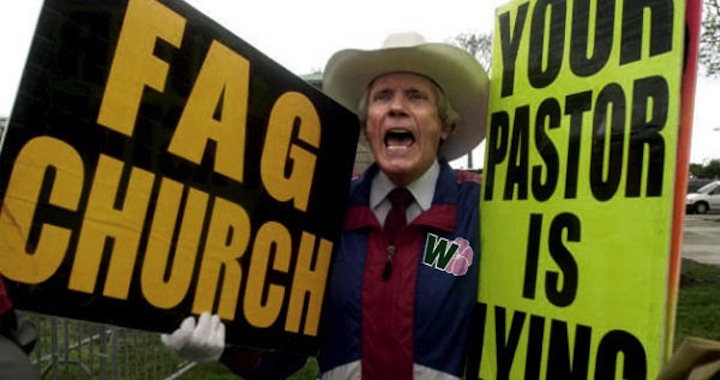UPDATE: Fred Phelps passed away on Wednesday, March 19 at the age of 84
According to a Twitter post by Fred Phelps’ son Nathan, the 84-year-old patriarch of Topeka’s infamous Westboro Baptist Church is in hospice care, near death. Phelps’ tactics of spreading his “God Hates Fags” message were so harsh that even the churches that are outspoken against homosexuality deplored what he was doing. Phelps, a disbarred lawyer, a four-time political candidate, an Eagle Scout and a civil rights activist in earlier years, will likely be forever known and remembered as the leader of that little gay-hating funeral-protesting church in Kansas.
Fred Phelps is a tragic figure, a life lived in such a way that few will mourn his death, and millions are likely to celebrate it. His “Fags Die God Laughs” picket signs are forever embossed on the public mind, the same public that will laugh with joy in the face of his death. The tragic irony.
Yet, it has been wisely stated that there is something to learn from every life, and Phelps is surely no exception. A man with gifts, a man who made some contributions to the world in the past, but, by his own choosing, a man who sold out along the way, maybe for fame and what he might have perceived as power.
Related: When God No Longer Hates Fags
Most church leaders with Phelps’ level of name recognition are mega-church leaders and/or TV evangelists, with their fame bringing even more growth to their churches; but Westboro Baptist Church reportedly has about 40 members, most of whom are family members of Phelps, and their media attention has not added parishioners to their pews. To add to his tragedy, many of his other family members, including son Nathan and three other of his 13 children, left the organization, and, according to Nathan’s Twitter report, the elder Phelps has been excommunicated from the church since August 2013.
Fred Phelps’ life seems a wasted one, but for those of us on the outside looking in, there is much we might learn if we will, first from Phelps’ own life, and second, from those of his followers.
Power. Not an unusual motivator, but always a dangerous one, for when power is gained too quickly, it almost always becomes abusive. Phelps was a failure in many ways. He was disbarred from his law practice. He ran for several political offices but never won. His church has not been successful. But – maybe it started with the murder of University of Wyoming student Matthew Shepard – the “God Hates Fags” picket signs caught the media’s attention, and Phelps’ name and face were soon recognized everywhere.
Did Phelps really hate gays that much, or was it all about personal power and media fame? Who can know? But we have all seen power take over people’s lives, especially those who seem to feel most without power. Administrators who abuse their staff, white supremacists, those who concoct elaborate lies online just to see how far they’ll spread, those who physically or emotionally abuse their spouse or children, gunmen who kill school children, those who troll blog sites with the goal of stirring people’s anger . . . The desire for power and fame is dangerous.
Then there’s the question of those who followed Phelps. Why? How does Phelps, Koresh, Billy Graham, Nelson Mandela, Jim Jones, Charles Manson, Gandhi, Martin Luther King Jr., Michael Moore, Rush Limbaugh, Jerry Falwell, Sun Myung Moon, Joseph Smith, MSNBC, Bill O’Reilly, the Dalai Lama, or Hitler attract followers? People follow people usually for fear or for attraction, and we are all people. We are all, by nature, learners, and we learn from those we “follow” – our ministers, our friends, our favorite talk show hosts, our favorite basketball players.
My pastor told a story Sunday of three neighborhood boys playing in the newly fallen foot-deep snow. The father of one of the boys challenged them to a competition. Positioning himself at the far corner of the yard, the challenge was to see which of the three boys could walk to him with the straightest path. One carefully watched his feet as he trod to the father. Another carefully watched the other two boys as he trod. And the third, the actual son of the father, kept his eyes on the father the entire walk. They finished with two very crooked paths and the last one straight.
Also by Kathy: Duck Hunting, Defrocking a Minister, and other Gay Tidings
When we “follow” our trusted mentors, even our trusted religious leaders, we are all susceptible to being led astray. The goal on which we focus should be carefully chosen. As Christians, while our pastors and teachers can be helpful guides, constant focus on the Christ from which we get our name is what will make our path straight.
Phelps was a misguided soul for whatever reason, as are all of us to some degree, ever seeking our own ways. May we not forget our own faults as we react to the sometime-in-the-future news of his passing, and may we find the grace to leave all judgment in the hands of God.
Two final personal questions to be sure our developing legacy is not like that of Phelps:
1. Are we oppressing or putting down others as we find our way?
2. Are we misusing the name of God to push our own agendas?
Would that our legacy be one of grace and love.

